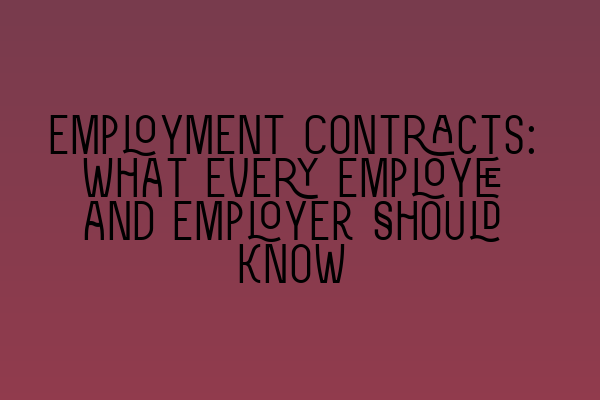When it comes to the relationship between employees and employers, one of the most important documents is the employment contract. This legally binding agreement governs the terms and conditions of employment, and it is essential for both parties to fully understand their rights and obligations.
What is an Employment Contract?
An employment contract is a written agreement between an employer and an employee that outlines the terms and conditions of employment. It sets out the expectations, rights, and responsibilities of both parties, ensuring clarity and transparency in the employment relationship.
Key Elements of an Employment Contract
Employment contracts can vary depending on the specific circumstances of the employment, but there are some key elements that are commonly included:
- Names and Contact Information: The contract should clearly state the full names and contact information of both the employer and the employee.
- Start Date: The contract should specify the agreed-upon start date of the employment.
- Job Title and Description: The contract should outline the job title and provide a detailed description of the employee’s duties and responsibilities.
- Working Hours: The contract should specify the number of hours the employee is expected to work per week and any overtime arrangements.
- Salary and Benefits: The contract should state the employee’s salary, any additional benefits, and how and when the employee will be paid.
- Holidays and Leave: The contract should outline the employee’s entitlement to annual leave, sick leave, and any other types of leave.
- Termination: The contract should include provisions for the termination of the employment, including notice periods and any potential termination benefits.
- Confidentiality and Non-Compete: The contract may contain clauses related to confidentiality and non-compete agreements, which restrict the employee from disclosing company information or working for a competitor after leaving the employment.
It is crucial for both employees and employers to carefully review and understand all the terms and conditions stated in the employment contract before signing it. If there are any concerns or uncertainties, seeking legal advice is highly recommended.
Employee Rights and Protections
Employees are protected by various laws and regulations, even if they do not have a written employment contract. However, having a written contract can provide additional clarity and protection for both parties. Some key employee rights and protections include:
- Minimum Wage: Employees are entitled to receive at least the minimum wage as set by law.
- Working Time Regulations: Employees have the right to rest breaks, maximum working hours, and paid annual leave.
- Protection Against Discrimination: Employees should not be discriminated against based on factors such as race, gender, age, disability, or sexual orientation.
- Protection from Unfair Dismissal: Employees have the right to challenge unfair dismissal and seek compensation if they have been dismissed without valid reasons or proper procedures.
- Maternity and Paternity Leave: Employees have the right to take time off work for maternity or paternity leave, and they may be entitled to statutory maternity or paternity pay.
It is important for employers to be aware of these rights and ensure that they comply with labor laws and regulations. Failing to do so can result in legal consequences and reputational damage.
Seeking Legal Advice and Assistance
Employment contracts can sometimes be complex or contentious, especially in situations where negotiations are involved or there are particular concerns or disputes. In such cases, it is advisable to seek legal advice from a qualified solicitor.
At SQE Contract Law, we have a team of experienced employment law solicitors who can provide expert advice and guidance on all aspects of employment contracts. Our solicitors can help both employees and employers understand their rights and obligations, negotiate favorable terms, and resolve any disputes that may arise.
If you are an employee or an employer and need assistance with an employment contract or any other employment-related matter, do not hesitate to contact us for a consultation.
Related Articles:
